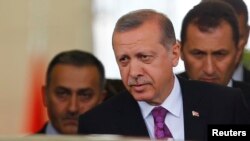Spurred by last week’s jihadist suicide bombing in southern Turkey, the government of President Recep Tayyip Erdogan has started to assume the kind of front-line role Washington has been urging on it for months. But Turkish airstrikes since the bombing have been as focused on Turkey’s outlawed Kurdistan Workers’ Party (PKK) as on Islamic extremists, say opposition politicians.
Opposition politicians are accusing Erdogan of using the campaign against Islamic militants as cover for cracking down on the Kurds and to stir war fever, predicting that Turkey’s president will call an early election on the ground that the country is facing a national emergency.
The pro-Kurdish People’s Democratic Party (HDP) on Saturday accused Erdogan of planning "to set the country on fire” in preparation for an election, hoping that by doing so his Justice and Development Party (AKP) will secure the parliamentary majority that eluded it in June polls.
“It is a plan to set the country on fire for the government to secure a single-party government in a snap election by creating a militaristic and nationalist climate while creating an impression like it is conducting a comprehensive fight with terrorism,” HDP leaders argued in a statement.
For weeks, the country’s politicians have been locked in coalition talks, but the prospect for a deal between the ruling AKP and either of the two main opposition parties has looked increasingly dim.
'No connection'
U.S. officials on Sunday stressed that as far as Washington is concerned, there is “no connection” between the new Turkish policy of getting tough with the Islamic State, or ISIL, and the airstrikes on the PKK.
The White House welcomed Turkey's increased efforts to combat ISIL, but an official traveling with President Barack Obama in Kenya would not be drawn out on what the consequences of a renewed Kurdish insurgency in Turkey would be in the fight against the Islamic State.
The official told reporters the PKK is a “terrorist” organization, saying there is no connection between airstrikes against the PKK and a recent understanding between Washington and Ankara to intensify cooperation against ISIL.
Senior European officials, though, appear more publicly concerned by Ankara’s crackdown on the PKK.
Speaking Sunday, the European Union’s top diplomat, Federica Mogherini, expressed support for the Turks in their border clashes with Islamic militants and the Turkish airstrikes on Islamic State positions inside northern Syria, but emphasized the utmost need for keeping the Kurdish peace process alive.
The armed wing of the PKK announced just hours after Turkish warplanes struck the group’s military bases in northern Iraq Friday that it now considers the three-year-long cease-fire agreement with Ankara to be over, appearing to end a fragile off-and-on peace process.
Cease-fire support
In a statement issued by her office in Brussels, Mogherini affirmed support for Turkey’s military actions against ISIL, but “underlined the fundamental importance of keeping the settlement process with Kurdish people alive and on track. Terrorist groups must not spoil the process and the cease-fire must be preserved. Any action taken should avoid the risk of endangering the cease-fire and the Kurdish peace process that remains the best opportunity in a generation to solve a conflict that has claimed far too many lives.”
German Chancellor Angela Merkel also this weekend appeared to question the advisability of strikes on the PKK, urging Turkish Prime Minister Ahmet Davutoğlu to stick with the Kurdish peace process despite escalating violence, her office said.
According to German officials, Merkel assured Davutoğlu of the “solidarity and support of Germany in the fight against terrorism,” but also recalled “the principle of proportionality in the implementation of necessary measures.”
Turkey has detained dozens of suspected Islamic extremists in police raids, but hundreds of Kurdish and leftist activists. Turkish authorities have also been cracking down on peace marches organized in the wake of the July 20 bombing in Suruc by Islamic extremists.
Until last week, the Erdogan government had come under mounting complaints, both from inside Turkey and overseas, for its policy toward the Islamic State, with critics arguing it was not doing enough to combat the extremists from using Turkey as a logistical base and to interdict foreign recruits from transiting the country to join Islamic State in northern Syria.
There have also been accusations the Turkish authorities, in their eagerness to help topple Syrian President Bashar al-Assad, have been helping to funnel arms to the jihadists in Syria, something vehemently denied by Ankara.
Commandos' discovery
On Sunday, a senior Western official claimed to Britain’s Guardian newspaper that information gathered during a raid this year by U.S. commandos at the Syrian compound of Abu Sayyaf, who oversaw oil-smuggling operations for the Islamic State, points to high-level contacts between Turkish officials and leading Islamic extremists.
Until the Suruc bombing, Ankara appeared not to see IS as a national security threat to Turkey, according to Turkish newspaper columnist Mustafa Akyol. “In fact, in its list of problems in Syria, the Assad regime came first, Syrian Kurds came second, and ISIL came as only third.”
He added: “It is good to see that this self-delusion is slowly changing. But it is a belated change.”
For opposition politicians, the timing of the sudden shedding of reluctance to take on the Islamic State as well as the military confrontation with the PKK is suspicious.
Kemal Kılıçdaroğlu, leader of the Republican People's Party, told reporters over the weekend that Erdoğan is conducting a strategy aimed at preventing the formation of a coalition government and is eager for a snap election.
But government supporters dismiss the charge, saying Ankara has no alternative to battling both the Islamic State and the PKK. They maintain the PKK is to blame for the now apparently wrecked peace process by failing to lay down its arms and by resorting in the wake of the Suruc bombing to a series of shootings and bombings.
The latest came late Saturday with a car bombing in the town of Lice in southeast Turkey that left two Turkish soldiers dead.




